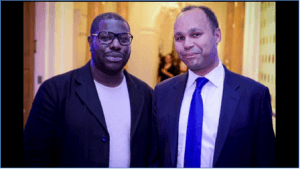Head of Politics Economics and Communications Group in the British Embassy: an inside view
By UCL Careers, on 6 November 2014
Ahead of our Government and Policy week James Kariuki writes his insider’s view on what it’s like to be the Head of Politics Economics and Communications Group in the British Embassy in Washington.
“There’s some folks who just really dislike me because they don’t like the idea of a black President… the flip side of is there are some folks who really like me and give me the benefit of the doubt precisely because I’m a black President”. Not for the first time, an Obama quote really struck a chord.

As a member of an ethnic minority, especially one historically perceived to be more threatening and less smart than the majority, you become aware that the colour of your skin is the first thing others see when you enter a place you are not expected. The question is whether initial surprise at your difference turns into lasting disadvantage, or whether you are able to overcome it and even convert it into opportunity.
Growing up in rural Surrey in the 70s and 80s, with an absent Kenyan father and a single white mother, the disadvantages were pretty evident. My brother and I were the only black kids in a private school of a thousand students, and certainly two of the poorest. Suspicious eyes were everywhere – from shopkeepers to village policemen; from the parents of early girlfriends to the skinheads on Brighton’s football terraces. Cambridge was hardly more diverse. But over time, friends and teachers became colour-blind. Opportunities revealed themselves: Marxist professors who wanted to support “my struggle”; rugby coaches who persevered because they believed I must be quicker than I really was; kids who thought I had some unique insight into jazz or hip-hop (even if I was more into The Smiths and The Stone Roses).
What’s this got to do with an FCO career? Well, when you’ve spent the first 20 years of life navigating your own difference, diplomacy and conflict prevention come naturally. Within your own organisation – like others who are “different” or “underrepresented” because of their gender, sexuality, or socio-economic background – you tread carefully at first, keep your head down a bit, work on getting by on merit. You occasionally have moments of self-doubt; or hold back from challenging authority for fear of standing out. But over time you become accepted into the mainstream, your difference fades, your voice and authority grows.

You face a whole new layer of complexity when you go abroad to represent your country. Your authority as a British diplomat is in doubt – many of us have had the tragi-comic experience of being taken for the driver or the security guard; or being challenged at the entrance to private clubs reserved for elites and expats.
But you find ways to pivot circumstances to your advantage. In Iraq, while my fellow Westerners on the weapons inspection team were treated as occupiers, I passed easily through downtown Baghdad. In Venezuela, I bonded with an anti-Colonialist, mixed-race Presidential candidate, Hugo Chavez, who affectionately called me “el negro ingles”. In New York, my credibility as the EU’s negotiator on development issues was enhanced by my own colour and funny name (my G77 counterpart was a burly, white South African). In the US, being part of a diverse UK and local workforce helps me and colleagues in our mission to understand, engage and influence America. For example, I’ve recently been promoting Steve McQueen’s project to take 12 Years a Slave to American schools, and have connected the British Director to President Obama’s initiative to build self-confidence and create opportunity for young, black Americans.
For most of my 20 years in the FCO, I believed that the best thing I could do for other members of minority groups was to demonstrate that I was at least as good as any member of the majority in the fantastic series of jobs I occupied. I still believe that to be the case. But I’ve also realised that I can use my relative success to support, encourage and inspire those from other underrepresented groups overcome the self-doubt and unconscious bias that sometimes holds them back from fulfilling their potential.
Thanks to the leadership in the FCO, our diversity agenda has real momentum. If through this effort we can break down institutional and cultural barriers to progress we can make our organisation not just a fairer one, but a much stronger one.”
To find out more information about the UCL Careers Government and Policy week, visit: http://www.ucl.ac.uk/careers/events/getinto/governmentandpolicy
 Close
Close

